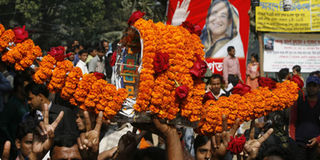Hasina wins Bangladesh poll in landslide

Supporters gather in front of Shudha Shadan, Bangladesh Awami League's President and former Prime Minister Sheikh Hasina's residence, with flowers to congratulate her in Dhaka December 30, 2008. An alliance led by Hasina won a massive parliamentary majority in the country's first polls in seven years, officials said on Tuesday, but a rival party complained of irregularities. Photo/REUTERS
DHAKA, Tuesday (Reuters) - An alliance led by Bangladesh's former prime minister Sheikh Hasina won a massive parliamentary majority in the country's first polls in seven years, officials said on Tuesday, but a rival party complained of irregularities.
Analysts said it was unclear if the losers would accept the results or take their supporters onto the streets to protest, despite comments from independent monitors that the election appeared largely fair and credible.
Political confrontations, strikes and street violence have often hampered the effectiveness of Bangladeshi governments. Monday's election marked the country's return to democracy after two years of emergency rule imposed by an army-backed interim government.
"It's critical that both sides accept the result ... If not, Bangladesh risks sliding back into the anarchy, violence and corruption that have characterised its past," U.S.-based Asian Society Fellow Sheridan Prasso told Reuters.
The "Grand Alliance" led by Hasina's Awami League had so far won 255 seats in the 300-seat parliament, officials said.
With just 31 seats going to a group led by Begum Khaleda Zia, another former prime minister, it was the worst showing ever for her and her party, and the best for the Awami League since before independence from Pakistan in 1971.
Populist rivals Hasina and Khaleda alternated in power for 15 years up to 2006 in Bangladesh's personality-dominated politics.
Hasina was widely seen as having the election edge, but the size of her landslide win could prove a problem by raising expectations she can deliver on all her election promises.
"People might now think that with the biggest election success of the Awami League since 1970, Hasina will arrange for them everything she listed in the election manifesto," Bangladesh Political Science Association chairman Ataur Rahman said.
"But such things would be difficult in the current global scenarios, especially the international financial crisis."
Foreign direct investment in Bangladesh in 2007 was $666 million, down from $793 million in 2006.
Hasina has pledged to contain prices and promote growth in a country of more than 140 million people and where 45 percent of the population live below the poverty line.
Aside from economic problems, the winner will have to tackle endemic corruption and chronic political and social unrest.
A leader of Khaleda's Bangladesh Nationalist Party said its supporters were kept from voting in various parts of the country, and it was filing a complaint.
"We have reports that BNP supporters were barred from coming to polls and also were driven away from polling stations in many places," BNP leader Rizvi Ahmed said at a news briefing.
Peaceful polls
The poll was generally peaceful, with both independent observers and many voters saying they saw few glitches. Previous elections were marred by widespread accusations of vote-rigging.
"All Bangladeshis can take great pride in the success of these elections. The high voter turnout underscores the people's desire to see democracy restored," Gordon Duguid, a U.S. State Department spokesman, said in a statement.
Analysts said it may be less important who won than that the losers accept the results.
Problems went unresolved during the 15 years while Hasina and Khaleda were in power partly because of protests, strikes and street violence from their parties when out of office. The turbulence has kept investors away and distracted the government from other challenges.
Bangladesh's neighbours also worry that an increasingly violent Islamist militant minority could provide support and shelter for radicals in their own countries.
Most Bangladesh Muslims are moderates, however. Analysts said Khaleda suffered from the presence in her alliance of Islamist party Jamaat-e-Islami. Its chief and other leaders lost their seats as its parliamentary members dropped from 17 to 2.
"She courted the Islamists, ignoring popular sentiments. An apparent dislike of young voters (for her alliance) was another key factor," said political scientist Ataur.
Delwar Hossain, campaign manager for a BNP candidate in the eastern Brahmanbaria district, told Reuters: "The results came as a big shock to us. Nothing worked like we had expected. People seemed determined to change."
Added retired major-general M.A. Matin, the interim government's home affairs adviser (minister): "The election results were a very positive development. People have rejected the (BNP alliance) for corruption and other misdeeds."
"The new government will take charge in about 10 days."




